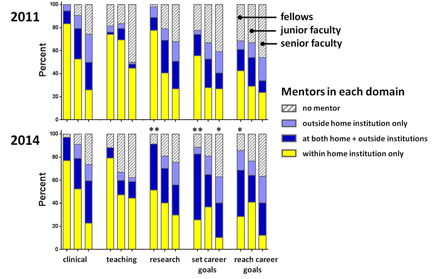Session Information
Date: Sunday, November 8, 2015
Title: Education
Session Type: ACR Concurrent Abstract Session
Session Time: 4:30PM-6:00PM
Background/Purpose: Mentoring is a key contributor to
success in academic medicine. In pediatric rheumatology, surveys have
repeatedly identified mentoring as a major career unmet
need of fellows and junior faculty.
In response, in 2011 the American College of Rheumatology (ACR) and the
Childhood Arthritis & Rheumatology Research Alliance (CARRA) launched a
subspecialty-wide inter-institutional mentoring program for pediatric
rheumatologists, the ACR/CARRA Mentoring Interest Group (AMIGO). Our objective
is to evaluate if implementation of AMIGO was associated with improved access
to mentoring in pediatric rheumatology.
Methods: US and
Canadian pediatric rheumatology fellows, junior faculty (assistant professor
and below) and senior faculty (associate professors and above) were surveyed in
2011 (pre-AMIGO) and again in 2014 (post-AMIGO). Participants were asked to report access
to mentoring in domains relevant to academic rheumatology: clinical practice,
teaching, research, setting career goals, and identifying how to achieve career
goals. Respondents reported whether mentoring in each domain was available at
the home institution, at an outside institution, at both or neither, and were
asked to rate overall satisfaction with career mentoring.
Results: Respondents
to each survey included >50% of pediatric rheumatologists in the US and
Canada (n=277 in 2011; n=177 in 2014 and 59% AMIGO participants). By 2014, 86%
of fellows and 31% of junior faculty were AMIGO mentees. In 2011, fellows were
substantially less likely than senior faculty to have mentoring outside the
home institution. This difference resolved by 2014. By 2014, the proportion of
fellows with outside mentors increased markedly in the domains of research,
setting career goals, and achieving career goals (Figure 1). No change was
observed in clinical or teaching domains. Overall, fellows but not junior
faculty reported an increase in satisfaction with career mentoring between 2011
and 2014.
Conclusion: The implementation of AMIGO was
associated with improved access to mentoring beyond the home institution for
fellows in pediatric rheumatology as well as an increase in satisfaction with
career mentoring measureable at the level of the whole community. These findings support the efficacy of
the subspecialty-wide AMIGO mentoring program, and suggest that AMIGO may serve
as a model for mentoring programs in adult rheumatology and in other domains of
medicine.
Figure 1:
Access to Mentoring in 2011 and in 2014
To cite this abstract in AMA style:
Moorthy LN, Muscal E, Riebschleger M, Klein-Gitelman MS, Nigrovic LE, Rouster-Stevens KA, Ferguson PJ, Eberhard BA, Brunner HI, Prahalad S, Schneider R, Nigrovic PA. Improvement in Mentoring Associated with Implementation of an Inter-Institutional Mentoring Program within Pediatric Rheumatology [abstract]. Arthritis Rheumatol. 2015; 67 (suppl 10). https://acrabstracts.org/abstract/improvement-in-mentoring-associated-with-implementation-of-an-inter-institutional-mentoring-program-within-pediatric-rheumatology/. Accessed .« Back to 2015 ACR/ARHP Annual Meeting
ACR Meeting Abstracts - https://acrabstracts.org/abstract/improvement-in-mentoring-associated-with-implementation-of-an-inter-institutional-mentoring-program-within-pediatric-rheumatology/

